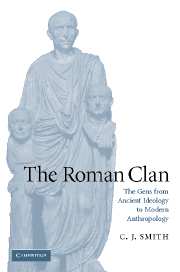Book contents
- Frontmatter
- Contents
- List of illustrations
- Preface
- List of abbreviations
- General introduction
- Part I THE EVIDENCE FOR THE GENS
- Chapter 1 The ancient evidence
- Chapter 2 Modern interpretations
- Chapter 3 The gens in the mirror: Roman gens and Attic genos
- Chapter 4 Archaeology and the gens
- Part I: Conclusion
- Part II TOWARDS AN INTERPRETATION OF THE GENS
- Appendix 1 Dionysius of Halicarnassus on the Roman curiae and religion
- Appendix 2 The missing curiae
- Select bibliography
- General index
- Index of ancient persons
- Index of passages discussed
Chapter 2 - Modern interpretations
Published online by Cambridge University Press: 22 September 2009
- Frontmatter
- Contents
- List of illustrations
- Preface
- List of abbreviations
- General introduction
- Part I THE EVIDENCE FOR THE GENS
- Chapter 1 The ancient evidence
- Chapter 2 Modern interpretations
- Chapter 3 The gens in the mirror: Roman gens and Attic genos
- Chapter 4 Archaeology and the gens
- Part I: Conclusion
- Part II TOWARDS AN INTERPRETATION OF THE GENS
- Appendix 1 Dionysius of Halicarnassus on the Roman curiae and religion
- Appendix 2 The missing curiae
- Select bibliography
- General index
- Index of ancient persons
- Index of passages discussed
Summary
INTRODUCTION
In the previous chapter I set out the ancient evidence for the gens, and showed that the scrappy and inconclusive material will not readily yield a single picture of this institution. Today's ancient historians are used to operating with this level of uncertainty, however, and have developed sophisticated techniques for filling in the gaps. We are accustomed to the absences in our record created by the vagaries of time and fortune, and are eager seekers for more or less legitimate ways of continuing to write history. Moreover, we have a long tradition of scepticism with regard to the sources; and we have had a powerful motivation to create order. The desire to see or to make patterns dominates our thinking. In the case of the gens, as I intend to show in this chapter, that desire has been particularly strong. First, as part of a legal discourse, the gens has had to find a place in the great systems which dominate legal scholarship. Roman law has a vital and honourable place in the legal traditions of western Europe and there are good reasons for lawyers to wish to understand the social context of Roman legal thinking on issues such as property and inheritance. The presence of the gens in the Twelve Tables ensured that it has been an important locus for debate about the evolution of law.
- Type
- Chapter
- Information
- The Roman ClanThe Gens from Ancient Ideology to Modern Anthropology, pp. 65 - 113Publisher: Cambridge University PressPrint publication year: 2006

